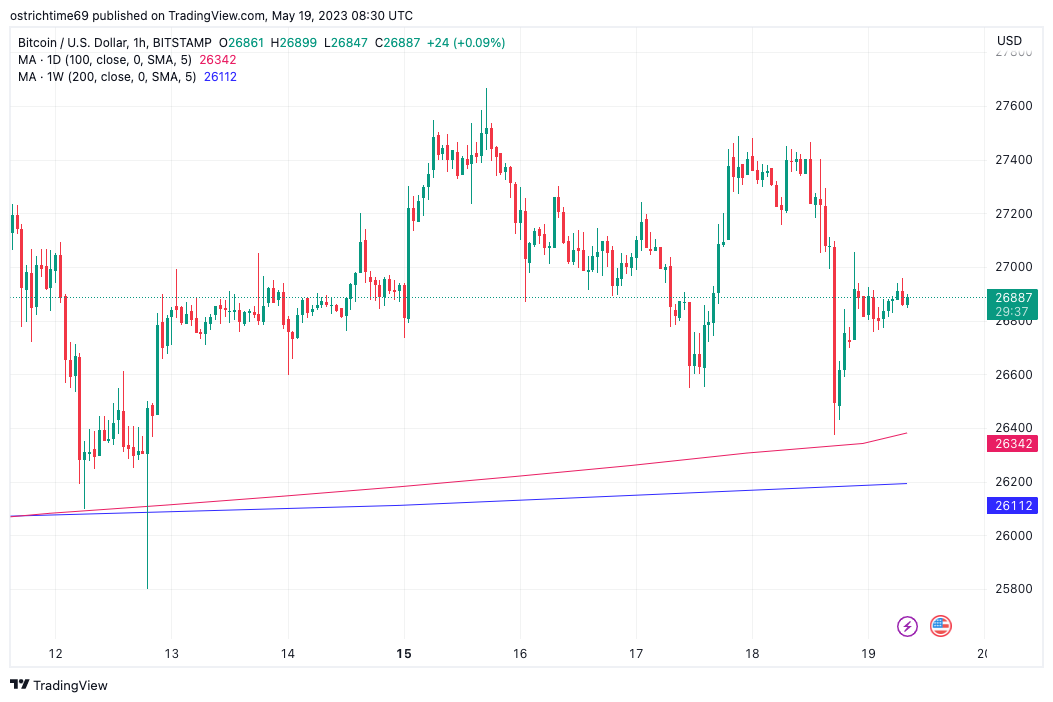
Bitcoin price retests key support as Fed rate hike fears steal $27K

Bitcoin bulls fail to stem fresh losses, with BTC price abandoning prior strength and opportunistic whales manipulating the arena with liquidity.
Bitcoin (BTC) traded back below $27,000 on May 19 as analysis flagged large-volume trades pressuring price.

Inflation specter haunts crypto markets
Data from Cointelegraph Markets Pro and TradingView showed BTC/USD hitting lows of $26,380 on Bitstamp.
A modest recovery then took the pair to a range familiar from several days prior, this still in focus prior to the week’s final Wall Street open.
Downside overnight came courtesy of increasing market expectations of an interest rate hike by the United States Federal Reserve in June.
These came thanks to low jobless claims data for the week, with Fed officials adding a hawkish tone.
“On the one hand, inflation is too high, and we have not yet made sufficient progress on reducing it,” a speech by board member Philip Jefferson at the 2023 International Insurance Forum in Washington, D.C., stated.
“On the other hand, GDP has slowed considerably this year, and even though the effect has been muted in the labor market so far, demand clearly has begun to feel the effects of interest rates that are 5 percentage points higher than they were a little over a year ago.”
According to CME Group’s FedWatch Tool, the odds of the Fed pausing its hiking cycle next month, at one point over 95%, stood at just 62% on the day.

In a detailed breakdown of the events, monitoring resource Material Indicators showed owners of bid and ask liquidity placing trades to manipulate BTC price behavior on short timeframes.
“After chopping sideways, markets began to price in potential for another rate hike as the morning’s Jobless Report and #FED speakers set the tone for that conversation ahead of #JPow’s appearance, scheduled for Friday,” part of Twitter commentary summarized.
“As price began to drop, a ladder of bids was rugged and price moved to prior support ~$26.5k, but a sell wall was quickly placed to suppress price.”

Material Indicators noted that BTC/USD performed a retest of the 100-day moving average (MA) — its third in the past seven days.
“After about 90 mins and a few nibbles at the sell wall, the roof was pulled. Shortly after that a new $36M block of bids was placed below local support and the melt up began,” it added.
In addition to the 100-day MA, the 200-week MA at $26,100, the analysis concluded, could also form a downside support zone next.

Material Indicators referenced the May 19 appearance by Fed Chair Jerome Powell, with the implication that further hawkish language on inflation would add to risk asset price pressure.
Traders in “wait and see” mode
Traders thus maintained potential bearish targets, these focusing on a broad area around $25,000.
Related: Hyperbitcoinization coming, says Bitcoin OG as ‘wholecoiners’ hit 1 million
Michaël van de Poppe, founder and CEO of trading firm Eight, was among them, identifying $27,000 as the key support level now absent from the chart.
Wanted #Bitcoin to hold above $27,000-27,200.
Didn’t happen, stopped out on my longs and in the waiting game now.
Reclaim that range, we’ll try again, or now we’ll be waiting for $26,400 sweep and/or $25,000.
— Michaël van de Poppe (@CryptoMichNL) May 18, 2023
“I am looking for a long if we can break above $27,500, or a short if we close below $26,600. No trade in between this tight range,” popular trader Crypto Tony added in part of Twitter comments.

Trading suite Decentrader meanwhile flagged uninspiring numbers when it came to shorts versus longs, arguing that a shift was required for price to have a shot at reclaiming higher levels.
“Long/Short ratio is currently above 2 which is very high. This typically needs to resolved and move lower before things start looking bullish,” it acknowleged.
Magazine: ‘Moral responsibility’: Can blockchain really improve trust in AI?
This article does not contain investment advice or recommendations. Every investment and trading move involves risk, and readers should conduct their own research when making a decision.
Go to Source
Author: William Suberg









